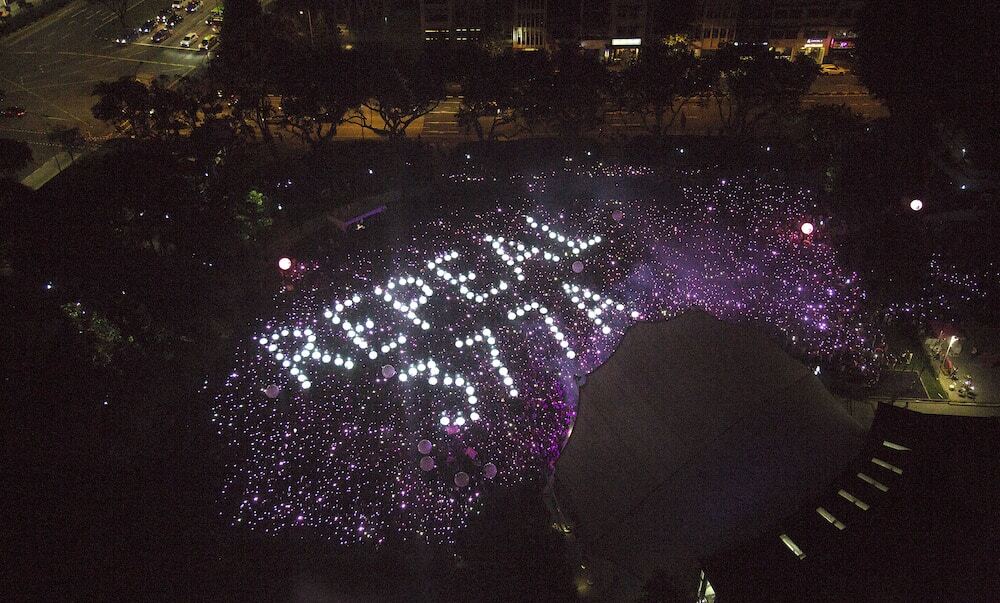
Singapore will abolish Section 377A, the colonial-era law banning sex between men. The decision, announced by Prime Minister Lee Hsien Loong on Sunday, will essentially decriminalise gay sex in the city-state where advocacy groups have long been fighting for LGBTQ rights and equality.
The section in Singapore’s Penal Code has existed since 1938, when Singapore was a British colony. The inherited law punished sex between men with prison sentences for up to two years.
“I believe this is the right thing to do, and something that most Singaporeans will now accept,” Lee said of the decision, as reported by Reuters.
Just this February, Singapore’s Court of Appeal said that the section would remain in place, but that it could not be enforced to prosecute men. In June, a survey found that less than half of Singapore’s population supported Section 377A, a drop of 11 percent from when the same research was conducted in 2018.
“We need to find the right way to reconcile and accommodate both the traditional mores of our society, and the aspiration of gay Singaporeans to be respected and accepted,” Lee said in his National Day Rally address. It was not made clear when the repeal will take place exactly.
Singapore joins other parts of Asia, like India and Taiwan, to make progress when it comes to LGBTQ rights.
The government’s decision comes after tireless advocacy from LGBTQ groups, who are now celebrating this step in the right direction, but are disappointed that systemic discrimination against LGBTQ people remains unmoved in the city-state’s laws.
Lee stressed that the “traditional” definition of marriage will be enshrined in Singapore’s constitution, ensuring that same-sex marriage will not be legalised. This move appears to be an appeasement towards religious groups in Singapore who are opposing the repeal of Section 377A.
“We believe that marriage should be between a man and a woman, that children should be raised within such families, that the traditional family should form the basic building block of society,” Lee said. Following the prime minister’s announcement, the Education Ministry of Singapore said in a statement on Monday that sex education in schools will be rooted in “traditional values, and sensitive to the multiracial and multi-religious make-up of our society.”
Though the news of decriminalisation of sex between men has been widely celebrated, the second part of the announcement has resulted in varied emotions from Singaporeans.
Sayoni, a feminist organisation that works to protect the rights of queer women, said in a statement sent to Mashable, “We express deep regret about the suggested changes to the constitution on the protection of heterosexual marriages by the prime minister. This will continue to render LGBTIQ persons unequal members of society.”
“The first step on a long road towards full equality for LGBTQ+ people in Singapore.”
Jean Chong, Sayoni’s co-founder, called on the government “to hold true to its promise of equality and non-discrimination towards all persons.”
“We look forward to further partnership with the government towards its aim of promoting a secular and democratic society that prioritises the sanctity and equity of all human lives,” said Chong.
Singapore LGBTQ community nonprofit Oogachaga sent Mashable a separate statement written by a coalition of 22 LGBTQ organisations, which said that they are “relieved” by the repeal, and called it “a win for humanity.” However, the group similarly stressed that this is still “the first step on a long road towards full equality for LGBTQ+ people in Singapore.”
“As we celebrate this historical milestone, we urge the community, and indeed all Singaporeans, to continue to imagine and work toward a better future for all,” the statement read. “A society without Section 377A is a society that is more progressive, not just for LGBTQ+ people, but for everyone. No one is free until everyone is free.”
The organisations emphasised that the path forward for LGBTQ rights in Singapore will require continued rejection of stigma and bigotry, and will see groups like Sayoni and Oogachaga needed to provide even more support to LGBTQ communities during this time.
“We must, in the face of potential backlash, strengthen ties within our community and look out for one another,” the group statement added.
